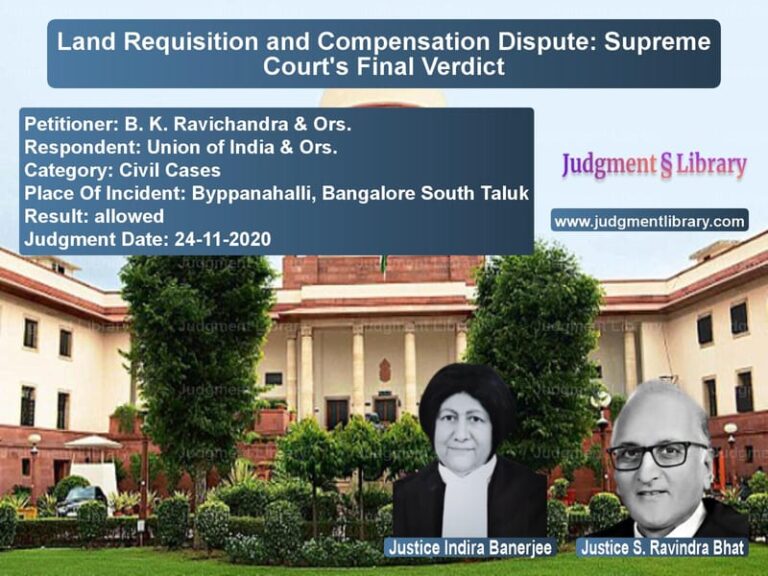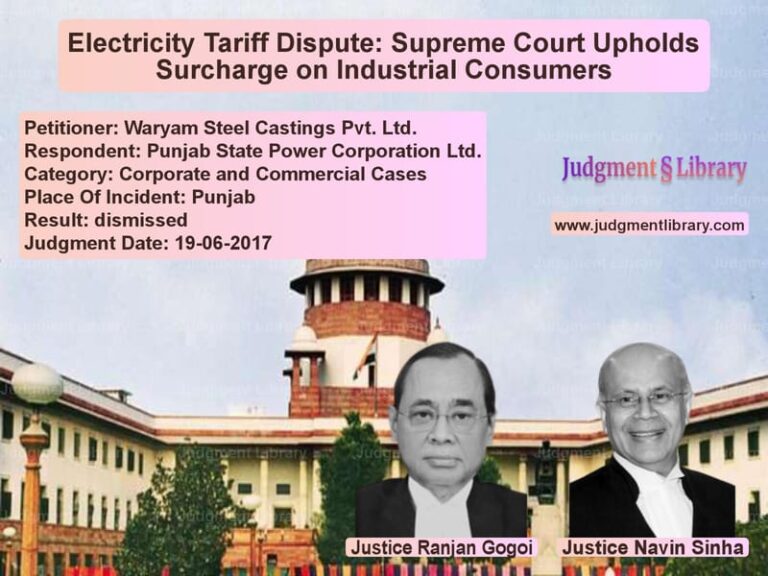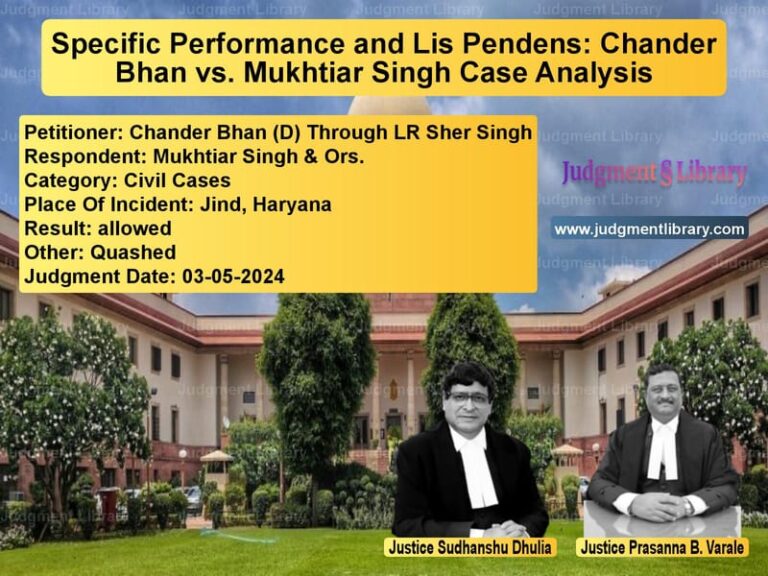Murder Conviction Overturned: Supreme Court Acquits Gadadhar Chandra in West Bengal Case
The case of Gadadhar Chandra vs. The State of West Bengal revolves around a murder conviction under Section 302 read with Section 34 of the Indian Penal Code (IPC). The accused, Gadadhar Chandra, was sentenced to life imprisonment by the Sessions Court, a ruling that was later upheld by the Calcutta High Court. However, the Supreme Court reviewed the evidence and found significant inconsistencies, ultimately acquitting the accused.
This judgment underscores the importance of proving common intention under Section 34 of IPC and highlights the necessity of credible witness testimony in criminal cases.
Background of the Case
The incident took place on August 2, 1976, when Purna Chandra Ghosh, a school teacher, was allegedly attacked by two individuals, Gadadhar Chandra (the appellant) and Arjun Mondal (a juvenile at the time). The attack occurred near a railway gate while the victim was returning home from school with PW1 Khiroda Mohan Paul, the Head Master of the school.
According to the prosecution, the accused stopped the victim and questioned him regarding an alleged assault on Gadadhar’s elder brother. A verbal altercation followed, during which both accused pulled out knives. PW1 claimed that Gadadhar brandished his knife and threatened him, while Arjun engaged in a scuffle with the victim. During the fight, Arjun allegedly stabbed Purna Chandra Ghosh, leading to his death. Both accused fled the scene.
The police arrested Gadadhar Chandra, while Arjun Mondal, being a juvenile, was sent for trial before the Juvenile Justice Board. However, the record of his trial was lost in the 2000 floods, and no further proceedings occurred against him.
Arguments of the Petitioner (Gadadhar Chandra)
The defense, led by Senior Advocate Siddhartha Dave, argued that:
- There was no pre-planned attack, and no evidence proved prior concert or a pre-arranged plan.
- The only role attributed to the appellant was brandishing a knife and issuing a verbal threat, but no physical assault.
- There was a scuffle between Arjun and the victim, leading to the stabbing. The appellant was not involved in the stabbing.
- The knife allegedly used by the appellant was never recovered.
- The appellant had already served seven years and six months in prison.
Arguments of the Respondent (State of West Bengal)
The prosecution, led by Advocate Nikhil Parikshith, countered with the following points:
- The accused had prior enmity with the victim, establishing motive.
- Testimonies from witnesses, including PW6, PW11, and PW13, confirmed that the accused was present and played an active role in the crime.
- The statement of co-accused Arjun Mondal under Section 164 of the Criminal Procedure Code (CrPC) corroborated the role of the appellant.
- The appellant’s act of brandishing a knife, holding the victim’s collar, and threatening the witness established his complicity.
- The appellant made no effort to stop the attack, proving a shared intention.
Supreme Court’s Observations
The Supreme Court, comprising Justices Ajay Rastogi and Abhay S. Oka, closely examined the evidence and found major inconsistencies.
Key observations included:
- No evidence of prior planning: There was no proof of a pre-arranged plan or common intention between the accused.
- Failure to examine key witnesses: The prosecution failed to examine two crucial witnesses, Susanta Kr. Chandra and Rabu, who were present at the scene.
- Unreliable prosecution evidence: The statement of Arjun Mondal recorded under Section 164 CrPC was inadmissible against Gadadhar, as Arjun was being tried separately.
- No physical involvement: The only act attributed to Gadadhar was brandishing a knife and threatening a witness. He did not participate in the stabbing.
- Failure to recover Gadadhar’s knife: While Arjun’s knife was recovered, there was no recovery of any weapon from the appellant.
The Court also emphasized that Section 34 IPC requires proof of common intention, which was absent in this case.
Supreme Court’s Verdict
On March 15, 2022, the Supreme Court ruled:
- The conviction of Gadadhar Chandra under Section 302 read with Section 34 IPC was incorrect.
- The prosecution failed to establish that Gadadhar shared a common intention to kill the victim.
- The failure to produce key witnesses and the lack of direct evidence led to reasonable doubt.
- The conviction and life sentence were set aside.
- The appellant was acquitted of all charges.
The Court concluded:
“The prosecution has failed to prove the ingredients of Section 34 IPC. The appellant has been implicated only with the aid of Section 34. Therefore, the appeal must succeed.”
Conclusion
This ruling highlights the necessity of proving common intention in cases of joint liability under Section 34 IPC. The judgment reinforces key legal principles:
- Mere presence at a crime scene is insufficient: An accused must actively participate with a shared intent to be convicted under Section 34 IPC.
- Key witnesses must be examined: The prosecution’s failure to call important witnesses weakens its case.
- Inadmissibility of co-accused statements: Statements made under Section 164 CrPC cannot be used against another accused unless they are being tried together.
- Burden of proof remains on the prosecution: Doubts in the prosecution’s case favor the accused.
The Supreme Court’s decision serves as a crucial precedent in criminal law, ensuring that convictions are based on solid evidence and not mere presumptions.
Petitioner Name: Gadadhar Chandra.Respondent Name: State of West Bengal.Judgment By: Justice Ajay Rastogi, Justice Abhay S. Oka.Place Of Incident: West Bengal.Judgment Date: 15-03-2022.
Don’t miss out on the full details! Download the complete judgment in PDF format below and gain valuable insights instantly!
Download Judgment: gadadhar-chandra-vs-state-of-west-bengal-supreme-court-of-india-judgment-dated-15-03-2022.pdf
Directly Download Judgment: Directly download this Judgment
See all petitions in Murder Cases
See all petitions in Bail and Anticipatory Bail
See all petitions in Juvenile Justice
See all petitions in Judgment by Ajay Rastogi
See all petitions in Judgment by Abhay S. Oka
See all petitions in allowed
See all petitions in Quashed
See all petitions in supreme court of India judgments March 2022
See all petitions in 2022 judgments
See all posts in Criminal Cases Category
See all allowed petitions in Criminal Cases Category
See all Dismissed petitions in Criminal Cases Category
See all partially allowed petitions in Criminal Cases Category







